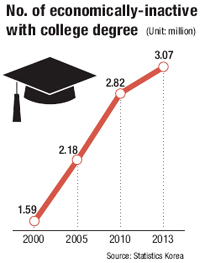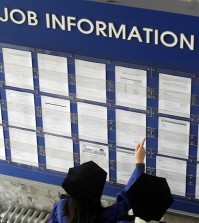- California Assembly OKs highest minimum wage in nation
- S. Korea unveils first graphic cigarette warnings
- US joins with South Korea, Japan in bid to deter North Korea
- LPGA golfer Chun In-gee finally back in action
- S. Korea won’t be top seed in final World Cup qualification round
- US men’s soccer misses 2nd straight Olympics
- US back on track in qualifying with 4-0 win over Guatemala
- High-intensity workout injuries spawn cottage industry
- CDC expands range of Zika mosquitoes into parts of Northeast
- Who knew? ‘The Walking Dead’ is helping families connect
Jobless college graduates top 3 mil.
By Kim Tae-jong
The number of college graduates who are “economically inactive” surpassed 3 million for the first time, government data showed Monday.
According to Statistics Korea, the number of people who have college degrees, but gave up searching for jobs soared to 3.08 million last year, up 3.2 percent from the previous year.
The number has been on a steady increase because of an increased number of university graduates. It stood at 1.59 million in 2000 but surpassed the 2 million mark in 2004.
“The number of unemployed with college degrees will be on an upward trend for a while,” Kong Mi-sook, an official from the agency, said. “The main reason is that there are a growing number of college graduates.”
The college entrance rate stood at 30 percent in the early 1990s but exceeded 80 percent in 2004 as the country set up more two-year or three-year vocational colleges nationwide, according to the statistics agency.
The number of graduates from two-year colleges and from four-year universities stood at 1,008,000, up 1.2 percent from the previous year, and 2,071,000, up 4.2 percent, respectively. This increasing number has also triggered an increase in the number of economically-inactive people. It stood at 14.05 million in 2000 but jumped to 16.22 million last year.
The ratio of the highly educated among the economically-inactive population has also been rising. In 2000, the ratio was about 11 percent but rose to 15 percent in 2005 and 18.98 percent last year, according to Statistics Korea.
Another factor is the rapidly aging population because more and more people are tending to stay out of work following retirement.
But experts said that the growing number of the economically-inactive with college degrees can be a problem, as highly educated human resources are not properly employed.
“The college entrance rate should be reduced, as too many people go to college now, although there is low demand for such highly-educated human resources,” said Park Che-khun, an official from the Korea Chamber of Commerce & Industry.
He also suggested that companies and the government should make increased efforts to allow female graduates, many of whom tend to become economically inactive, to find jobs so that they have a chance of developing their talents and contributing to the economy.













